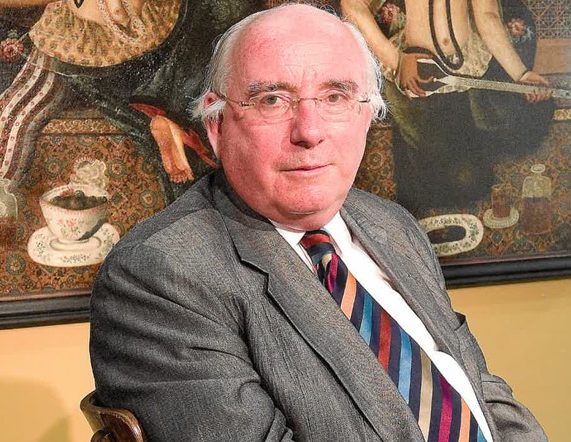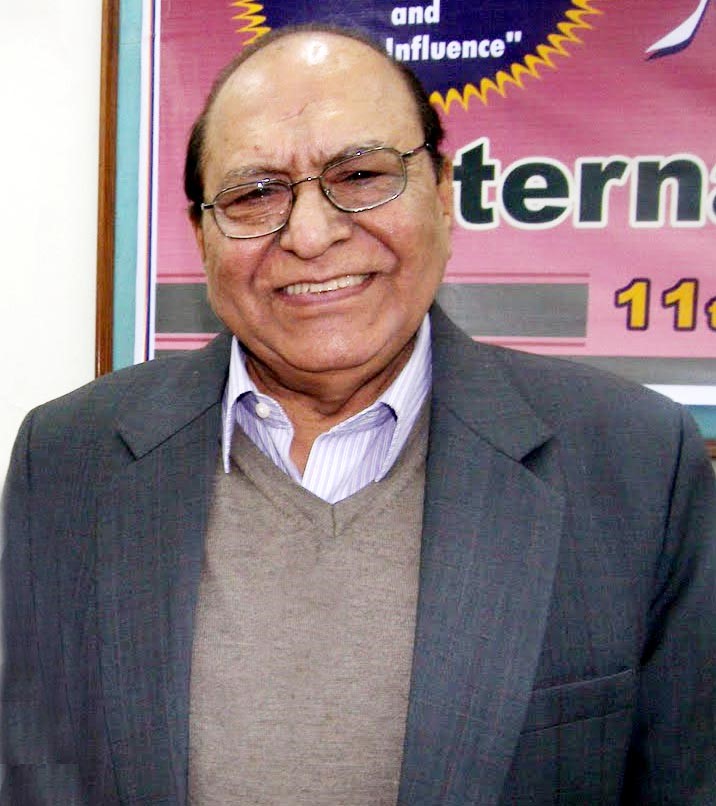Professor Francis Robinson is awarded the Sir Syed Excellence Award:
The Society congratulates Professor Francis Robinson (RAS President, 1997-2000 and 2003-2006, Chair of the Monograph Board and long-standing member of Council) who will receive the Sir Syed Excellence Award from Aligarh Muslim University on October 17th, as explained in the press release below.

Aligarh, October 3: Illustrious British historian and Professor of History of South Asia at the University of London, Dr Francis Christopher Rowland Robinson will receive the International Sir Syed Excellence Award 2021, and Prof Gopi Chand Narang (acclaimed Indian theorist, Padma Bhushan, and former president of the Sahitya Academy) will be given the National Sir Syed Excellence Award during the online Sir Syed Day Commemoration ceremony on October 17 of Aligarh Muslim University (AMU).
Vice Chancellor, Prof Tariq Mansoor, on the recommendation of a jury comprising Prof Asghar Abbas, Prof Ishtiaq Ahmad Zilli, Prof A R Kidwai, Prof Ali Mohammad Naqvi, Dr Mohammad Shahid, Mr Tariq Hasan and Prof M Shafey Kidwai selected the names of the awardees. The yearly International and National Sir Syed Excellence Awards carrying cash prizes of Rs 200000 and Rs 100000 respectively are given to noted scholars who produced outstanding intellectual seminal works in the areas of Sir Syed Studies, South Asian Studies, Muslim Issues, Literature, Medieval History, Social Reform, Communal Harmony, Journalism and Inter-Faith Dialogue.
The International Sir Syed Excellence Award recipient, Prof Francis Robinson’s research has been focussed on the Muslim World and he has authored 14 scholarly works including The Ulama of Farangi Mahall and Islamic Culture in South Asia (New Delhi: Permanent Black, 2001; London: Hurst, 2002; Lahore: Ferozesons, 2002) and Jamal Mian: The Life of Jamaluddin Abdul Wahab of Farangi Mahall, 1919-2012 (Karachi: Oxford University Press, 2018; New Delhi: Primus, 2020). His profound works carrying the fruits of academic rigour enable the reader to engage with the inner worlds of the Farangi Mahallis in general and that of Jamal Mian in particular.
His other seminal works on the Islamic World include Atlas of the Islamic World Since 1500 (1982); Islam and Muslim History in South Asia (2000); The Mughal Emperors (2007) and Islam, South Asia, and the West (2007).
He has extensively researched and produced work on the Islamic history of South Asia, in particular the role of Ulama (Religious Scholars) and Sufis (Islamic mystics).
He has explored the great movement of revival and reform in the Muslim world since the eighteenth century; the new ways of being Muslim which this movement developed; the responses of Muslims to Western dominance in their world since 1800 and the various forms of modernity which Muslims have fashioned.
Prof Robinson received a CBE in 2006 for services to higher education and research in Islamic history. He has served as President of the Royal Asiatic Society for two terms (1997-2000, 2003-2006) and was the Vice-Principal of Royal Holloway, University of London, from 1997-2004, serving as the head of the History Department from 1990-1996. Prof Robinson is also a visiting professor at Oxford University and the University of Washington.

Prof Gopi Chand Narang, the National Sir Syed Excellence Awardee, is an esteemed literary critic and scholar who writes in Urdu and English with a range of modern theoretical frameworks including stylistics, structuralism, post-structuralism and Eastern poetics.
His recent books on Ghalib (Oxford University Press), Urdu Ghazal (Oxford University Press) and Mir Taqi Mir (Penguin) have received widespread acclaim across the globe. He has published more than 60 scholarly and critical books on language, literature, poetics and cultural studies; many have been translated into other Indian languages.
Prof Narang’s formative work includes the Hindustani Qisson se Makhooz Urdu Masnaviyan (1961), Urdu Ghazal aur Hindustani Zehn-o-Tehzeeb (2002) and Hindustan ki Tehreek-e-Azadi aur Urdu Shairi (2003). He has also authored well-known books on socio-cultural and historical studies such as Amir Khusrow ka Hindavi Kalaam (1987), Saniha-e-Karbala bataur Sheri Isti’ara (1986) and Urdu Zabaan aur Lisaniyaat (2006).
Prof Narang holds the rare distinction of being a Professor Emeritus of the University of Delhi and Jamia Millia Islamia. He has also received the honorary Doctor of Letters degrees from three leading universities, namely the Aligarh Muslim University (2009), Maulana Azad National Urdu University (2008) and the Central University in Hyderabad (2007).
He was the Vice-Chairman of the Delhi Urdu Academy (1996–1999) and the National Council for Promotion of Urdu Language – HRD (1998–2004) and served as the Vice-President (1998–2002) and President (2003–2007) of the Sahitya Akademi.
He has been bestowed with the Padma Bhushan (2004), Padma Shri (1990), Sahitya Akademi Award (1995), Ghalib Award (1985), Urdu Academy’s Bahadur Shah Zafar Award (2010), Bharatiya Bhasha Parishad Award (2010), Madhya Pradesh Iqbal Samman (2011) and the Bharatiya Jananpith Moorti Devi Award (2012). The Sahitya Akademi conferred on Dr Narang its highest honour, the Fellowship, in 2009.
Public Relations Office
Aligarh Muslim University
Upcoming Events:
On Monday October 11th at 5pm, the Society’s Director will be participating in a webinar series organised by the Society for the Medieval Mediterranean. In the first event of the series, Dr Cailah Jackson (Oxford, Centre for Islamic Studies) will present research based on her book ‘Islamic Manuscripts of Late Medieval Rūm, 1270s–1370s: Production, Patronage and the Arts of the Book’ in conversation with Dr Patricia Blessing (Princeton University) and Dr Alison Ohta (Royal Asiatic Society).
Readers can register by clicking on the following link: https://theofed-cam-ac-uk.zoom.us/webinar/register/WN_u97QU6ndQnu6dG4inXoYvA
Book Launch: Professor Marc Baer
Please join us at 6:30pm on Thursday October 21st for the book launch of Professor Marc Baer’s ‘The Ottomans: Khans, Caesars and Caliphs’.
Recounting the Ottomans’ remarkable rise from a frontier principality to a world empire, historian Marc Baer traces their debts to their Turkish, Mongolian, Islamic, and Byzantine heritage. The Ottomans pioneered religious toleration even as they used religious conversion to integrate conquered peoples. But in the nineteenth century, they embraced exclusivity, leading to ethnic cleansing, genocide, and the empire’s demise after the First World War.

Lecture: Dr Simon Kaner
Readers are also reminded that on Thursday 14th October at 6:30pm, Dr Simon Kaner will be giving a lecture on ‘The Rehabilitation of Myth in the Archaeology of Ancient Japan and Korea’.
Please note that both of these events will be taking place in-person and virtually. To register for these, please email mb@royalasiaticsociety.org, stating your preference for how you would like to attend.
